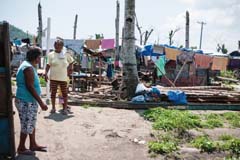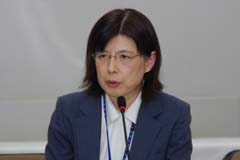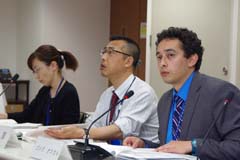Second Authors' Workshop on the Comparative Study of Humanitarian Crisis Management from the Perspective of Bilateral Cooperation Agencies Research Project -The continuum of humanitarian crisis management-
2016.05.20
The notion that "relief alone is not enough" is common to all actors involved in humanitarian crises and their management. This notion was officially framed at the United Nations (UN) in 1991 as a "continuum from relief to rehabilitation and development" and today remains a challenging task in the agenda of international assistance.
JICA-RI has been conducting a research project entitled "Comparative Study of Humanitarian Crisis Management from the Perspective of Bilateral Cooperation Agencies" since January 2015, and it held the second authors' workshop on April 25, 2016, at the JICA Ichigaya Building. The purpose of the workshop was to discuss the results of the second phase of the project on the case studies covering natural disasters and armed conflicts, such as Hurricane Mitch in Central America, the Indian Ocean tsunami and Typhoon Yolanda in the Philippines, the East Timor conflict, the Syrian crisis and the South Sudan conflict.

Residents living in an area hit by Typhoon Yolanda, the Philippines (Photo: JICA/Mika Tanimoto)
As opening remarks, Nobuko Kayashima, JICA-RI's deputy director, said, "'Seamless assistance' has been called for in crisis management. I hope this study will help achieve this goal, contributing to actual practice and academic research in the future."
With the participation of advisors Professor Yukie Osa of Rikkyo University and Professor Hiroshi Higashiura of the Japanese Red Cross College of Nursing, authors gave six presentations. The presenters on armed conflicts were Emeritus Professor Ryoji Tateyama of the National Defense Academy (the Syrian crisis), Research Fellow Tomoaki Honda of the Canon Institute for Global Studies and Research Associate Yukako Tanaka Sakabe of Waseda University (Timor-Leste), and Research Fellow Chigumi Kawaguchi of JICA-RI (South Sudan). The presenters on natural disasters were Senior Advisor Mikio Ishiwatari at JICA (Indian Ocean Earthquake and Tsunami, Indonesia), Assistant Professor Yasuhito Jibiki and Professor Yuichi Ono at Tohoku University (Typhoon Yolanda, The Philippines), and Research Fellow Oscar A. Gomez at JICA-RI (Hurricane Mitch, Honduras).
The authors discussed whether the continuum was realized in each individual case. Then in the discussion session, researchers argued mainly about the differences and similarities between armed conflicts and natural disasters, the relevance to the statement for World Humanitarian Summit, the definitions of terms relating to humanitarian crisis management and so on.
JICA-RI Research Fellow Oscar A. Gomez outlined his case study on Hurricane Mitch, which devastated huge swaths of Honduras. His discussion centered on how prevention and recovery interacted in the long term in the case of Honduras, describing the effects of overoptimistic plans by the international community and the Honduran government, along with disagreements on the approach to disaster risk management, all of which resulted in gaps.

JICA-RI Deputy Director Nobuko Kayashima gives her opening remarks
He explained that, while the Honduran government appealed for recovery assistance, the international community recommended pursuing national transformation as its goal for realizing the continuum in the long term, displacing from the center of the attention disaster risk management. He found that transformation became basically the same as development and recovery, while the reduced support to disasters found further difficulties in diverging visions of what kind of national system was needed. He discussed how the aid of the U.S. was large in quantity but temporally restricted, resulting in sacrificed quality and little long term planning, while that of the European Union failed to integrate local actors because their projects were remotely controlled with no delegation present in the field. He said Japan put an emphasis in infrastructure reconstruction with prevention cautiously incorporated into the planning, but actual implementation took too long and efforts were scarcely documented.
"There is no doubt that teaching people how to evacuate in the case of an emergency is of great importance, but preventing landslides altogether would be definitively better," Gomez said, stressing the need for a prevention perspective from early on and balanced disaster risk management.
JICA-RI Research Fellow Chigumi Kawaguchi's presentation was on the case of South Sudan. The presentation focused on three donors - the United States, the European Union and Japan - and it examined differences in their approaches from the perspectives of three issues: strategy, coordination and funding. It discussed possible factors that promoted and prevented the realization of the continuum.
She explained that in the reflection on the people needs, linking relief and development has been recognized as an important issue from the early 1990s to the present day, and donors have been putting effort into realizing the continuum under such different approaches as development, rehabilitation, early recovery and resilience. However, swaying political relation between donors and recipients often influenced donors' approach to realizing the continuum.

JICA-RI Research Fellows Oscar A. Gomez (right) and Chigumi Kawaguchi (left)
Through the detailed discussion of each case, authors and advisors were able to examine differences and commonalities among the six cases; involvement of local government in the continuum approach; the political relationship between donors and government; and the different meanings of terms in the context such as resilience.
In the discussions, the researchers agreed that actors need to move beyond a linear understanding of crisis management and work in concert, transcending the divide of their mandates and mindsets, to realize the full continuum. They also confirmed the need to bring "locals" into the heart of crisis management, and mainstream prevention on a long-term basis to create a more resilient society than before pre-crisis levels.
JICA-RI Director Naohiro Kitano said in his closing remarks, "We had a fruitful discussion for the publication of the research results. I hope JICA-RI will effectively communicate our messages at the World Humanitarian Summit and other opportunities."
The project will submit the results of the first and the second phases to the World Humanitarian Summit as five messages;
An academic publication is expected as the final result of the project.

事業事前評価表(地球規模課題対応国際科学技術協力(SATREPS)).国際協力機構 地球環境部 . 防災第一チーム. 1.案件名.国 名: フィリピン共和国.

事業事前評価表(地球規模課題対応国際科学技術協力(SATREPS)).国際協力機構 地球環境部 . 防災第一チーム. 1.案件名.国 名: フィリピン共和国.

事業事前評価表(地球規模課題対応国際科学技術協力(SATREPS)).国際協力機構 地球環境部 . 防災第一チーム. 1.案件名.国 名: フィリピン共和国.

事業事前評価表(地球規模課題対応国際科学技術協力(SATREPS)).国際協力機構 地球環境部 . 防災第一チーム. 1.案件名.国 名: フィリピン共和国.

事業事前評価表(地球規模課題対応国際科学技術協力(SATREPS)).国際協力機構 地球環境部 . 防災第一チーム. 1.案件名.国 名: フィリピン共和国.